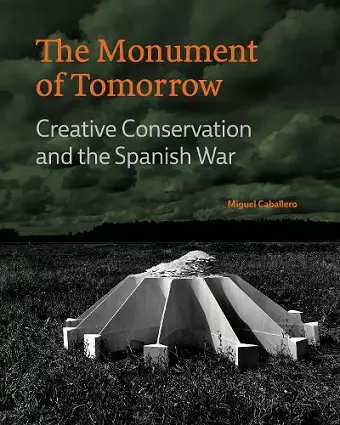The Monument of Tomorrow
Creative Conservation and the Spanish War
Format:Hardback
Publisher:Pennsylvania State University Press
Published:13th Aug '25
£69.99
Supplier delay - available to order, but may take longer than usual.

A cultural history of experimental monumentality and conservation in Spain in the first half of the twentieth century.
Rupture, iconoclasm, and tabula rasa are concepts commonly used to describe the approach to cultural heritage associated with the avant-garde and revolutionary politics during the early twentieth century. Highlighting artists and radical intellectuals who worked to protect public monuments in 1910–1950s Spain, The Monument of Tomorrow challenges the persistent narrative, imposed by Francoism, of an iconoclastic Second Republic in Spain.
Author Miguel Caballero draws on a wide range of sources to examine how artists, architects, writers, and activists transformed monument and heritage conservation into a progressive, experimental cause in their fight against fascism. During the Spanish War, with its devastating air raids, these individuals were motivated by the “defense of culture” to become determined conservationists. Caballero’s research incorporates surviving monuments, architectural plans, propaganda posters, and literary works, including novels, plays, and poetry. The war became a laboratory for experiments in conserving and redefining monuments and national heritage. Modernist-style protective structures, for example, were built atop Madrid’s historic monuments, including statues of Cybele, Neptune, and Phillip III in Plaza Mayor. Such innovations later influenced strategies for safeguarding monuments during the Second World War. This history, Caballero argues, makes the Spanish War pivotal to development of the concept of World Heritage.
Ultimately, The Monument of Tomorrow demonstrates that heritage conservation does not have to be politically conservative. Those interested in anti-fascism, art history, modern architecture, modernism, cultural heritage, conservation and preservation, Iberian studies, and war studies should find valuable insights in this innovative, original work.
“Miguel Caballero’s highly innovative book reveals that cultural conservation and political conservatism did not align during the Spanish Civil War (the Spanish War, as the author rightly calls it). The book’s conservation angle sheds new light on the history of the Spanish conflict while also contributing to a better understanding of early twentieth-century concerns for cultural heritage often overshadowed by the avant-garde’s language of destruction.”
—Eugenia Afinoguénova, author of The Prado: Spanish Culture and Leisure, 1819–1939
“This book is much more than a cultural history of experimental concepts of heritage conservation and monumentality in Spain between 1931–1939. In this remarkably engaging study, Caballero breaks with and breaks down commonly held Franco-era assumptions about the destruction of cultural heritage during the Second Republic and invites us to pay closer attention to how collective ideas about heritage both sustain and destabilize nationalist narratives.”
—Susan Larson, author of Constructing and Resisting Modernity: Madrid 1900-1936
ISBN: 9780271099231
Dimensions: 254mm x 203mm x 24mm
Weight: 998g
254 pages